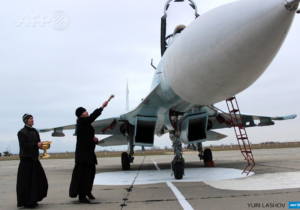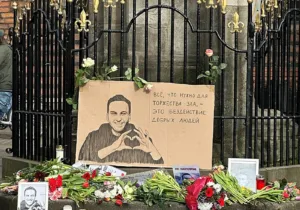Last weekend’s apparent attempted coup against Putin in Russia evinced so much that is murky and unsavory about Russia. On Saturday, as the Wagner Group was rolling towards Moscow, Russian Orthodox Patriarch Kirill publicly appealed for “those who, having taken up arms in their hands, are ready to direct them against their brethren, to think again.” Urging “unity of mind” against the “common threat,” he declared: I support the efforts of the Head of the Russian State aimed at preventing unrest in our country.”
Kirill declared that “any attempt to sow discord within the country is the greatest crime that has no justification,” especially, “when the enemies are making every effort to destroy Russia.”
Who are these “enemies” trying to “destroy” Russia? They are presumably the same “enemies” that every tyrant and aggressor cites when conducting wars of conquest, which are always supposedly “defensive” or “preemptive.” For the Russia church chieftain, who merely spiritualizes his master Putin’s agenda, opposing Putin’s regime is the “greatest crime.” But plunging the country into a pointless war that’s killed hundreds of thousands merits the de facto state church’s unquestioning support.
Kirill’s puerile support for the dictator leading Russia towards ever greater disaster is a long religious tradition. Russia’s Orthodox Church, with some brave exceptions, has habitually backed its civil rulers, no matter how horrific, for centuries: czars, Soviets, and now Putin’s mafia style regime. In unquestioningly blessing irrational cruelty and repression, the church helps to suffocate constructive dissent and reform that might prevent conflict and calamity.
Ideally, the church in any society warns against pride, hubris and overreach, fostering self-reflection, caution, and repentance. Instead, Kirill, who lives in the lavish style of Putin’s oligarchs, self-servingly sanctions the policies that ultimately will destroy Putin, killing thousands more in the process. Unwittingly, and ironically, Kirill is an instrument of divine judgment against the ruler he strives to serve.
Kirill’s undeviating support for Putin and war against Ukraine reflects a spiritual ailment in Russian Orthodoxy. That ailment lauds passivity and deference towards corruption and injustice by the ruler. From this perspective, the ruler has divine sanction to enact his will. But individual citizens have little to no corresponding responsibility for stewardship of their society. They must merely submit and accept.
As the Wagner Group seized Russian army facilities and drove towards Moscow, with little organized opposition, Russia as a nation seemed to stand aside as a spectator to rather than a shaper its own fate. Few seemed to rally to the rebellion. But even fewer seemed resolved to stand in its way. Instead, the response was languid acceptance of unfolding events.
In Rostov, where the Wagner Group seized the regional army headquarters, a cyclist was seen objecting to a bridge closure that complicated his ride. His irritation perhaps represented the height of resistance. At least the cyclists will assert their rights to passage, no matter what calamity the nation faces. Others posed for selfies with the Wagner Group’s warlord. Himself a partner to the worst of Putin’s war crimes, the Wagner chief launched his apparent coup from pique and self-interest rather than any patriotic concern.
There are patriotic and courageous Russians in jail for resisting Putin’s crimes, including his war on Ukraine, but they number only in the hundreds. Most Russians apparently still feign to support Putin, at least until he’s gone, and then they will support the successor. There seems to be little communal concern for the public good. In other nations, hundreds of thousands would have taken to the streets to reclaim their country. In Russia, large crowds only turned out for a mindless fireworks display in St. Petersburg to celebrate school graduations.
Russian Orthodoxy, the nation’s premier church for over 1000 years, shaped this attitude of docility towards rulers, no matter how tyrannical. In this tradition, there is a “symphonia” or partnership between church and state, in which theoretically neither disputes the other’s authority in its sphere. Not only do they not dispute, but they actively support the jurisdiction and power of the other. So the Russian state subsidizes and privileges Russian Orthodoxy, while the church actively supports the government’s policies, whatever they are. There is little if any room for Christian critique of the state or solidarity with the state’s victims. The church’s interests are conflated with the state’s interests. And the ruler’s interests are conflated with the nation’s interests. There are few spiritual resources for resistance to a predatory ruler.
Some in the West hail or at least glamorize this Russian traditionalism that seems to protect Christianity and resist Western secularism. But the price for this “protection” is steep. When the ruler kills and steals even on a massive scale, the church must remain supportive. In so doing, the church becomes complicit in the state’s crimes. Patriarch Kirill has on his hands the blood of hundreds of thousands who have died in Ukraine, both Ukrainians and hapless young Russian soldiers.
Whatever the faults of Western Christianity, it does more clearly define the limits of state power. And it does understand God to assign political sovereignty not just to rulers but to all individuals, each of whom has a duty before God to steward society.
A spiritually healthy Russia would not docilely stand by during a mercenary coup, during a wicked war of aggression, or a degenerating dictatorship. There have been brief moments of courageous and responsible political action in Russia, in 1917 and 1991, that were not sustained. Putin’s hubris and cupidity, enabled by the Russian church and much of the complacent population, resulting in the Ukraine tragedy, will bring inevitable calamity to the whole nation.
Patriarch Kirill offered “prayers that the Lord may preserve peace and unity, jeopardized by calls for confusion.” But Russia has neither peace nor unity. And Kirill is himself an agent of confusion. Against such misplaced “prayers,” may the Lord withhold His judgment and save Russia from itself. And may He spare the whole world from the consequences of Russia’s potential disintegration.







 Sponsor a student for Christianity & National Security 2024
Sponsor a student for Christianity & National Security 2024